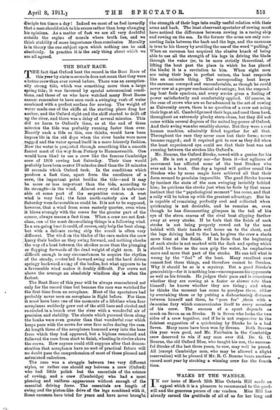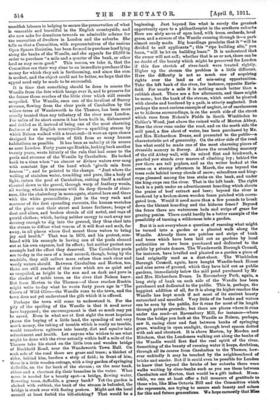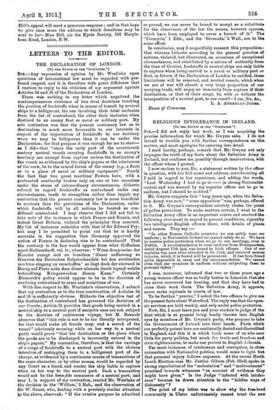WALKS BY THE WANDLE.
IN our issue of March 25th Miss Octavia Hill made an appeal which it is a pleasure to recommend to the good- will and the generous purses of our readers. Miss Hill has already earned the gratitude of all of us for her long and
unselfish labours in helping to secure the preservation of what is venerable and beautiful in the English countryside, and she now asks for donations towards an admirable scheme for the recreation of dwellers in London and the suburbs. She tells us that a Committee, with representatives of the various Open Spaces Societies, has been formed to purchase land lying along the banks of the Wandle, and she appeals for £3,000 in order to purchase "a mile and a quarter of the bank, or other land as may seem good." This means, we take it, that the Committee see their way clear to an immediate purchase if the money for which they ask is forthcoming, and since the sum is modest, and the object could not be better, we hope that the appeal need only be made to be successful It is time that something should be done to rescue the Wandle from the fate which hangs over it, and to preserve for the future those reaches of the little river which still remain unspoiled. The Wandle, once one of the loveliest of Surrey streams, flowing from the clear pools of Carshalton by the willow-trees of Wandsworth to the Thames, has been more cruelly treated than any tributary of the river near London. For miles of its short course it has been built in, dishonoured and defiled as if, instead of being one of the most charming features of an English countryside—a sparkling stream by which Nelson walked with a trout-rod—it were an open cloaca designed for the reception of filth from as many human
habitations as possible. It has been as unlucky at its source as near London. Forty years ago Ruskin, looking back another
twenty years, wrote bitterly of the ruin that had come to the pools and streams of the Wandle by Carshalton. He looked back to a time when " no clearer or diviner waters ever sang with constant lips of the hand which 'giveth rain from heaven' " ; and he pointed to the change. " Just where the welling of stainless water, trembling and pure, like a body of light, enters the pool at Carshalton, cutting itself a radiant channel down to the gravel, through warp of feathery weeds, all waving, which it traverses with its deep threads of clear- ness, like the chalcedony in moss-agate, starred here and there with the white grenouillette ; just in the very rush and murmur of the first spreading currents, the human wretches of the place east their street and house foulness ; heaps of dust and slime, and broken shreds of old metal, and rags of putrid clothes ; which, having neither energy to cart away nor decency enough to dig into the ground, they thus shed into the stream to diffuse what venom of it will float and melt, far away, in all places where God meant those waters to bring joy and health." That was in 1870, and his protest, com- bined with his example in having one of the pools cleaned out at his own expense, had its effect ; but neither protest nor example had the effect they deserved. The Carshalton pools are to-day in the care of a local council, though, being by the roadside, they still collect more refuse than such clear and weedy waters should. Between Carshalton and Merton, too, there are still reaches of the river which are as quiet and as unspoiled, as bright in the sun and as dark and pure in the shadow of noble trees, as the river that Nelson knew. But from Merton to the Thames—of those reaches Ruskin might write to-day what he wrote forty years ago in "The Crown of Wild Olive—the Wandle runs to the town, and the town does not yet understand the gift which it is offered.
Perhaps the town will come to understand it. For the pity of the spoiling of the Wandle is that it need never have happened ; the encouragement is that so much may yet be saved. Even in what are at first sight the most hopeless paces the buying of a little land, the spending of not very naueh money, the taking of trouble which is really no trouble, would transform ugliness into beauty, dirt and squalor into refreshment and health. Let anyone who wishes to see what might be done with the river actually within half a mile of the Thames take his stand on the little iron and wooden bridge of Buckhold Road, near the Wandsworth Town Hall. On each side of the road there are grass and trees; a thicket of elder, behind him, borders a strip of field ; in front of him, there is a little wooden cottage, with a tiny garden of springing daffodils, on the far bank of the stream ; on the near bank, elders and a chestnut dip their branches in the water. What more is needed for a beauty spot—a bridge, flowing water, flowering trees, daffodils, a grassy bank ? Yet the garden is choked with rubbish, the bank of the stream is befouled, the bridge is stuck over with flaring posters. Might not the local council at least forbid the bill-sticking? That would be a beginning. Just beyond lies what is surely the greatest opportunity open to a philanthropist in the southern suburbs Here are sixty acres of open land, with trees, orchards, level grass, and a stream of the Wandle running through it—a park almost ready made. Big hoardings proclaim that it "will be divided to suit applicants " ; this "ripe building site," you learn, "will be let on building lease." It is understood that the owner will not sell; whether that is so or not, there can be no doubt of the beauty which might be preserved for London if this fine stretch of river-bank were treated rightly. Higher up the stream the problem is a little different. Here the difficulty is not so much one of acquiring rights over the land as of mis-using opportunities. Take the left hank of the river, for instance, opposite Earls- field. For nearly a mile it is nothing much better than a rubbish shoot. There are a few allotments, and there might be more ; but the bank of the stream, which could be planted with shrubs and bordered by a path, is utterly neglected. But perhaps the most curious example of neglect, or of carelessness as to hideous surroundings, is on the south side of the street which runs from Nelson's Fields in South Wimbledon to Collier's Wood, just above the ruined walls of Merton Abbey. Here the river runs under the road, and on the north side the mill pond, a fine sheet of water, has been purchased by Mr. and Mrs. Richardson Evans, and presented to the public—a characteristic act of generosity. On the other side of the road lies what could be made one of the most charming pieces of
riverside scenery in Surrey. Above the crumbling masonry of the old Abbey wall, with its mixed flint and brickwork, a gnarled yew stands over masses of climbing ivy; behind the yew there are tall poplars, and as the writer looked at the scene on a stormy afternoon in March, the sun beyond the trees rode behind tawny clouds of snow ; celandines and king- cups gleamed among the tree stubs on the bank, and under the king-cups ran the river. That is the left bank. The right bank is a path under an advertisement hoarding which shouts
the praise of beef extract and beer; beyond the river is bordered by a broken-down wooden fence patched with corru-
gated iron. Would it need more than a few pounds to break down the blatant hoarding and the hideous fence ? Beyond the fence there are watercress beds and strips of grass for grazing ponies. There could hardly be a better example of the possibility of turning a wilderness into a garden.
But it is not everywhere a question of rescuing what might be turned into a garden or a planted walk along the Wandle. Already there are patches and strips of bank and trees which have been laid out as gardens by local authorities or have been purchased and dedicated to the public by private donors. The Wandsworth Borough Council, for instance, have levelled and planted as a garden a piece of land originally used as a dust-shoot. The Wimbledon Borough Council, again, have bought Wandle-bank House and nine acres of ground, which they have laid out as publics gardens, immediately below the mill pond purchased by Mr and Mrs. Richardson Evans. In Ravensbury Park, again, a long strip of bank on each side of the Wandle has been purchased and dedicated to the public. This is, perhaps, the happiest addition of all, for it is along its higher reaches the Wandle has kept much if not most of its ancient beauty untouched and unsoiled. Very little of its banks and waters can be seen by the public, for it runs for most of its length through private grounds; but there are places where it runs under the road—at Ravensbury Mill, for instance—where from the bridge you look at the Wandle as Nelson, perhaps, saw it, racing clear and fast between banks of springing grass, winding in open sunlight, through level spaces dotted with oak and chestnut. It is above Merton, by Morden and Mitcham, that the Londoners walking out along the banks of the Wandle would first find the real spirit of the river. Something of the beauty of running water it keeps, doubtless, through all its course from Carshalton to the Thames, how.. ever unkindly it may be touched by the neighbourhood of bricks and smoke. But if it could even be possible for London to know that beyond the bricks of her suburbs there were walks waiting by river-banks such as you see them between Carshalton and Merton, that would be a gift indeed. Mean- while, we can at least offer a full measure of gratitude to those who, like Miss Octavio. Hill and the Committee which she represents, are trying to secure such beauty and solace for this and future generations. We hope earnestly that Miss
Hill's appeal will meet a generous response ; and in that hope we give once more the address to which donations may be sent to her—Miss Hill, cjo the Kyrie Society, 192 Marylee bone Road, London, N.W.












































 Previous page
Previous page